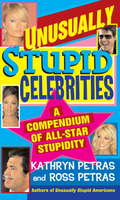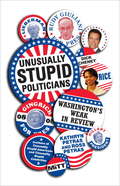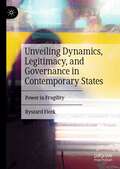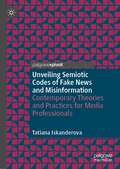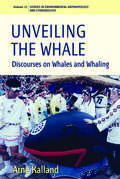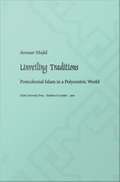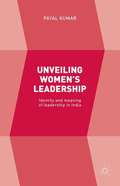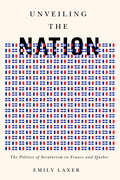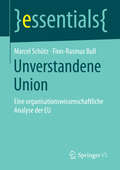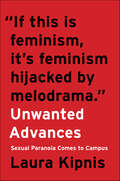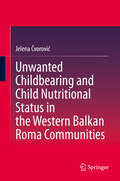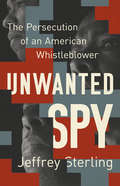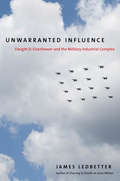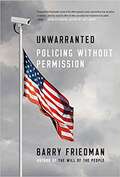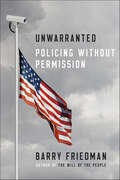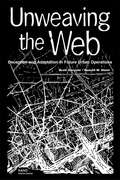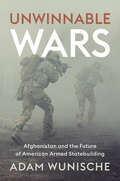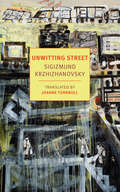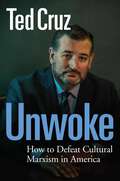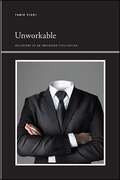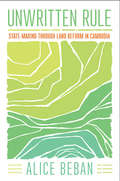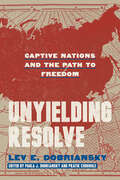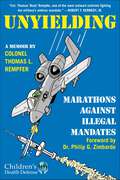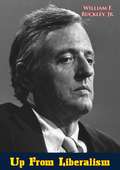- Table View
- List View
Unusually Stupid Celebrities: A Compendium of All-Star Stupidity
by Ross Petras Kathryn PetrasThe Greeks honored Zeus, the Romans revered Juno, but modern civilization worships a different sort of god: Celebrity. Face it, we follow the stars' every move, fashion choice, and deliciously dishy affairs. Now Kathryn Petras and Ross Petras, authors of Unusually Stupid Americans, pull the demanding divas, screwball stars, and celebu-twits off their pedestals-and prove it doesn't take a degree in rocket science to become famous. Cases in point: * Courtney Love misses an important court date relating to "possession of a controlled substance" because she can't find a professional bodyguard at the last minute. * Mariah Carey's entourage includes a skirt-from-touching-floor specialist, a towel hand-off person, and a professional drink holder/lifter. * Savvy traveler Paris Hilton concludes that all of Europe is, "like, French. " * Mensa candidate and rocker Tommy Lee is pretty sure that Winston Churchill was president during the Civil War, that the numeric equivalent of pi is "the two-equals-MC-squared thing," and that an isosceles triangle is "somewhere in Bermuda." Feuds, faith, family, money, sex, tantrums, travel-no star-studded stone is left unturned. Filled with jaw-dropping anecdotes, quirky quotes, and special stupid-celebrity awards, Unusually Stupid Celebrities provides a red-faced glimpse of the red carpet.
Unusually Stupid Politicians: Washington's Weak in Review
by Ross Petras Kathryn PetrasKathryn Petras and Ross Petras, bestselling authors of the scathingly funny Unusually Stupid Americans and Unusually Stupid Celebrities, now set their bipartisan sights on the hallowed halls of the United States government. Unusually Stupid Politicians exposes the mind-boggling but true political mishaps, missteps, and miscues that have even the savviest spin doctors shaking their heads and saying "No comment." Sections include * Extreme Hairsplitting--such as when Florida governor Jeb Bush, after being accused of hiding in a closet from rampaging Democrats, denied the allegation completely, stating that "it was actually a boiler room" * Brilliant and Innovative Ideas from The Pentagon-- like their groundbreaking "Gay Bomb," their "Bad Breath Inducing" halitosis weapon and their plans to enlist The Three Stooges in the fight against terror. * Creative Political Excuses--such as "I just discovered I'm Jewish and it's a Holy Day,"--used by Senator George Allen, who, after learning of his Jewish heritage, got out of a Senate hearing to "observe" Yom Kippur * The Most Egregiously Large Political Egos--measured in standard Chuck Schumer Ego Units (CSEUs). This hilarious and eye-opening exposé gives awards for "How I Blew My Campaign" and "Worst Campaign Ad," and shares a list of candidates "endorsed by God," as well as a list of those who lost because of Satan. So turn off C-SPAN and quit text-messaging congressional pages--you're about to learn what the definition of "is" is.
Unveiling Dynamics, Legitimacy, and Governance in Contemporary States: Power in Fragility
by Ryszard FicekThis book delves into the complex dynamics of legitimizing power in fragile states. With five comprehensive chapters, it analyzes the geopolitical, domestic, and international dimensions of fragile states. The unique contribution lies in unraveling specific forms of legitimization linked to various types of state fragility, providing a nuanced understanding. The book distinguishes between temporary crises and chronic fragility, crucial for shaping effective international support strategies. It addresses the challenges and consequences of weak legitimacy on global security, highlighting its impact on aid interventions and systemic stability. The author's analysis emphasizes the diverse nature of political regimes in fragile states, incorporating considerations of hybrid regimes. Additionally, it explores the dynamics of authoritarian enclaves at the sub-state level, revealing their potential national influence. By scrutinizing the decline of trust in democratic systems, the book addresses contemporary challenges, making it a vital resource for understanding and navigating the complexities of fragile states' political landscapes.
Unveiling Semiotic Codes of Fake News and Misinformation: Contemporary Theories and Practices for Media Professionals
by Tatiana IskanderovaThis book offers a comprehensive exploration of the widespread issue of fake news and misinformation. Using real-life examples and semiotic theory, the author demonstrates how language, images, and symbols are being utilized in media production and distribution with the intention of altering the perception of individuals and shaping their beliefs. The book also addresses how social and cultural factors influence the spread of information and emphasizes the importance of understanding the context in which information is being received and shared. This book is a must-read for anyone seeking to understand the impact of fake news and misinformation on society, especially academics, researchers, journalists, policymakers, and media professionals at all levels. The author provides contemporary theories and practical strategies to navigate the complex and ever-changing media landscape.
Unveiling The Whale
by Arne KallandWhaling has become one of the most controversial environmental issues. It is not that all whale species are at the brink of extinction, but that whales have become important symbols to both pro- and anti-whaling factions and can easily be appropriated as the common heritage of humankind. This book, the first of its kind, is therefore not about whales and whaling per se but about how people communicate about whales and whaling. It contributes to a better understanding and discussion of controversial environmental issues: Why and how are issues selected? How is knowledge on these issues produced and distributed by organizations and activists? And why do affluent countries like Japan and Norway still support whaling, which is of insignificant economic importance? Basing his analysis on fieldwork in Japan and Norway and at the International Whaling Commission, the author argues how an image of a "superwhale" has been constructed and how this image has replaced meat and oil as the important whale commodity. He concludes that the whaling issue provides an arena where NGOs and authorities on each side can unite, swapping political legitimacy and building personal relations that can be useful on issues where relations are less harmonious.
Unveiling Traditions: Postcolonial Islam in a Polycentric World
by Anouar MajidIn Unveiling Traditions Anouar Majid issues a challenge to the West to reimagine Islam as a progressive world culture and a participant in the building of a multicultural and more egalitarian world civilization. From within the highly secularized space it inhabits, a space endemically suspicious of religion, the West must find a way, writes Majid, to embrace Islamic societies as partners in building a more inclusive and culturally diverse global community. Majid moves beyond Edward Said's unmasking of orientalism in the West to examine the intellectual assumptions that have prevented a more nuanced understanding of Islam's legacies. In addition to questioning the pervasive logic that assumes the "naturalness" of European social and political organizations, he argues that it is capitalism that has intensified cultural misunderstanding and created global tensions. Besides examining the resiliency of orientalism, the author critically examines the ideologies of nationalism and colonialist categories that have redefined the identity of Muslims (especially Arabs and Africans) in the modern age and totally remapped their cultural geographies. Majid is aware of the need for Muslims to rethink their own assumptions. Addressing the crisis in Arab-Muslim thought caused by a desire to simultaneously "catch up" with the West and also preserve Muslim cultural authenticity, he challenges Arab and Muslim intellectuals to imagine a post-capitalist, post-Eurocentric future. Critical of Islamic patriarchal practices and capitalist hegemony, Majid contends that Muslim feminists have come closest to theorizing a notion of emancipation that rescues Islam from patriarchal domination and resists Eurocentric prejudices. Majid's timely appeal for a progressive, multicultural dialogue that would pave the way to a polycentric world will interest students and scholars of postcolonial, cultural, Islamic, and Marxist studies.
Unveiling Women's Leadership: Identity and Meaning of Leadership in India
by Payal KumarUnveiling Women's Leadership provides a penetrating insight into the world of Indian woman leaders. The book unravels the unique challenges facing the Indian woman leader who has to juggle several challenges including patriarchy, the caste system, harassment, and society's expectation that she ought to fit snugly into stereotypical roles.
Unveiling the Nation: The Politics of Secularism in France and Quebec (Rethinking Canada In The World Ser. #3)
by Emily LaxerOver the last few decades, politicians in Europe and North America have fiercely debated the effects of a growing Muslim minority on their respective national identities. Some of these countries have prohibited Islamic religious coverings in public spaces and institutions, while in others, legal restriction remains subject to intense political conflict. Seeking to understand these different outcomes, social scientists have focused on the role of countries' historically rooted models of nationhood and their attendant discourses of secularism. Emily Laxer's Unveiling the Nation problematizes this approach. Using France and Quebec as illustrative cases, she traces how the struggle of political parties for power and legitimacy shapes states' responses to Islamic signs. Drawing on historical evidence and behind-the-scenes interviews with politicians and activists, Laxer uncovers unseen links between structures of partisan conflict and the strategies that political actors employ when articulating the secular boundaries of the nation. In France's historically class-based political system, she demonstrates, parties on the left and the right have converged around a restrictive secular agenda in order to limit the siphoning of votes by the ultra-right. In Quebec, by contrast, the longstanding electoral salience of the “national question” has encouraged political actors to project highly conflicting images of the province's secular past, present, and future. At a moment of heightened debate in the global politics of religious diversity, Laxer's Unveiling the Nation sheds critical light on the way party politics and its related instabilities shape the secular boundaries of nationhood in diverse societies.
Unverstandene Union: Eine organisationswissenschaftliche Analyse der EU (essentials)
by Marcel Schütz Finn-Rasmus BullMarcel Sch#65533;tz und Finn-Rasmus Bull gewinnen in einer organisationswissenschaftlichen Analyse neue Erkenntnisse #65533;ber die besonderen Organisationsmerkmale der oft als politisches B#65533;ndnis oder Projekt umschriebenen Europ#65533;ischen Union (EU). Hierzu bedienen sie sich eines bew#65533;hrten Strukturansatzes aus der Systemtheorie Niklas Luhmanns und verbinden diesen mit dem Konzept der Metaorganisation. Dargelegt wird, welche erschwerten Bedingungen der Steuerung und Ver#65533;nderung in solchen Organisationen auftreten, deren Mitglieder nicht Individuen, sondern ebenfalls Organisationen sind. Die Autoren zeigen, dass vermeintliche St#65533;rungen und Defizite der organisierten Staatengemeinschaft sich hintergr#65533;ndig als elementare St#65533;rken und Vorz#65533;ge erweisen k#65533;nnen.
Unwanted Advances: Sexual Paranoia Comes to Campus
by Laura KipnisA Wall Street Journal Best Book of 2017 From a highly regarded feminist cultural critic and professor comes a polemic arguing that the stifling sense of sexual danger sweeping American campuses doesn’t empower women, it impedes the fight for gender equality.Feminism is broken, argues Laura Kipnis, if anyone thinks the sexual hysteria overtaking American campuses is a sign of gender progress. A committed feminist, Kipnis was surprised to find herself the object of a protest march by student activists at her university for writing an essay about sexual paranoia on campus. Next she was brought up on Title IX complaints for creating a "hostile environment." Defying confidentiality strictures, she wrote a whistleblowing essay about the ensuing seventy-two-day investigation, which propelled her to the center of national debates over free speech, "safe spaces," and the vast federal overreach of Title IX.In the process she uncovered an astonishing netherworld of accused professors and students, campus witch hunts, rigged investigations, and Title IX officers run amuck. Drawing on interviews and internal documents, Unwanted Advances demonstrates the chilling effect of this new sexual McCarthyism on intellectual freedom. Without minimizing the seriousness of campus assault, Kipnis argues for more honesty about the sexual realities and ambivalences hidden behind the notion of "rape culture." Instead, regulation is replacing education, and women’s hard-won right to be treated as consenting adults is being repealed by well-meaning bureaucrats.Unwanted Advances is a risk-taking, often darkly funny interrogation of feminist paternalism, the covert sexual conservatism of hook-up culture, and the institutionalized backlash of holding men alone responsible for mutually drunken sex. It’s not just compulsively readable, it will change the national conversation.
Unwanted Childbearing and Child Nutritional Status in the Western Balkan Roma Communities
by Jelena ČvorovićThis book investigates the relationship between maternal investment, unwanted births, and child nutritional outcomes in five poor communities of the Western Balkan Roma. Based on an evolutionary approach, the book directly assesses variability in Roma mothers’ parental care using data from UNICEF Multiple Indicator Cluster Surveys 5 and 6 for the Roma settlements in Serbia, Montenegro, Kosovo, Macedonia, and Bosnia and Herzegovina. The book includes useful information about Roma communities in the Western Balkans and their history and sufferings in the region. It reviews this history against the data on unwanted childbearing globally and in low- and middle-income countries. It addresses concerns related to Roma people's integration into European society, despite their longstanding presence in Europe. The book analyses the existence of health differentials among Roma children themselves, suggesting that some children are especially vulnerable. Therefore, it critically assesses how multiple (levels of) vulnerabilities affect differential Roma parental investment in children. This book is a useful resource for researchers interested in Roma studies, children's well-being, wellbeing of marginal groups, social work and social justice.
Unwanted Spy: The Persecution of an American Whistleblower
by Jeffrey SterlingThe powerful story of a CIA whistleblower and political prisoner who refused to give up on his American dreamIn 2015, Jeffrey Sterling was sentenced to prison, convicted of violating the Espionage Act. Sterling, it is now clear, was another victim of our government's draconian crackdown on alleged leakers and whistleblowers.Sterling grew up in a small, segregated town in Missouri and jumped at the chance to broaden his world and serve his country, first in law school and later in the CIA. After an impressive career, Sterling's progress came to a sudden halt: he was denied opportunities because of his race and was pushed out of the Agency. Later, Sterling courageously blew the whistle on the CIA's botched covert operation in Iran to Senate investigators. After a few quiet years in Missouri with his wife, he was arrested suddenly and charged with espionage. Unwanted Spy is an inspiring account of one man's uncompromising commitment to the truth and a reminder of the principles of justice and integrity that should define America.
Unwarranted Influence: Dwight D. Eisenhower and the Military-Industrial Complex
by James LedbetterIn Dwight D. Eisenhower's last speech as president, on January 17, 1961, he warned America about the "military-industrial complex," a mutual dependency between the nation's industrial base and its military structure that had developed during World War II. After the conflict ended, the nation did not abandon its wartime economy but rather the opposite. Military spending has steadily increased, giving rise to one of the key ideas that continues to shape our country's political landscape. In this book, published to coincide with the fiftieth anniversary of Eisenhower's farewell address, journalist James Ledbetter shows how the government, military contractors, and the nation's overall economy have become inseparable. Some of the effects are beneficial, such as cell phones, GPS systems, the Internet, and the Hubble Space Telescope, all of which emerged from technologies first developed for the military. But the military-industrial complex has also provoked agonizing questions. Does our massive military establishment--bigger than those of the next ten largest combined--really make us safer? How much of our perception of security threats is driven by the profit-making motives of military contractors? To what extent is our foreign policy influenced by contractors' financial interests? Ledbetter uncovers the surprising origins and the even more surprising afterlife of the military-industrial complex, an idea that arose as early as the 1930s, and shows how it gained traction during World War II, the Cold War, and the Vietnam era and continues even today.
Unwarranted: Policing Without Permission
by Barry Friedman“At a time when policing in America is at a crossroads, Barry Friedman provides much-needed insight, analysis, and direction in his thoughtful new book. Unwarranted illuminates many of the often ignored issues surrounding how we police in America and highlights why reform is so urgently needed. This revealing book comes at a critically important time and has much to offer all who care about fair treatment and public safety.” ―Bryan Stevenson, founder and Executive Director of the Equal Justice Initiative and author of Just Mercy: A Story of Justice and Redemption <p><p> In June 2013, documents leaked by Edward Snowden sparked widespread debate about secret government surveillance of Americans. Just over a year later, the shooting of Michael Brown, a black teenager in Ferguson, Missouri, set off protests and triggered concern about militarization of law enforcement and discriminatory policing. In Unwarranted, Barry Friedman argues that these two seemingly disparate events are connected―and that the problem is not so much the policing agencies as it is the rest of us. We allow these agencies to operate in secret and to decide how to police us, rather than calling the shots ourselves. And the courts, which we depended upon to supervise policing, have let us down entirely. <p><p> Unwarranted tells the stories of ordinary people whose lives were torn apart by policing―by the methods of cops on the beat and those of the FBI and NSA. Driven by technology, policing has changed dramatically. Once, cops sought out bad guys; today, increasingly militarized forces conduct wide surveillance of all of us. Friedman captures the eerie new environment in which CCTV, location tracking, and predictive policing have made suspects of us all, while proliferating SWAT teams and increased use of force have put everyone’s property and lives at risk. Policing falls particularly heavily on minority communities and the poor, but as Unwarranted makes clear, the effects of policing are much broader still. Policing is everyone’s problem. <p><p> Police play an indispensable role in our society. But our failure to supervise them has left us all in peril. Unwarranted is a critical, timely intervention into debates about policing, a call to take responsibility for governing those who govern us.
Unwarranted: Policing Without Permission
by Barry Friedman“At a time when policing in America is at a crossroads, Barry Friedman provides much-needed insight, analysis, and direction in his thoughtful new book. Unwarranted illuminates many of the often ignored issues surrounding how we police in America and highlights why reform is so urgently needed. This revealing book comes at a critically important time and has much to offer all who care about fair treatment and public safety.” —Bryan Stevenson, founder and Executive Director of the Equal Justice Initiative and author of Just Mercy: A Story of Justice and RedemptionIn June 2013, documents leaked by Edward Snowden sparked widespread debate about secret government surveillance of Americans. Just over a year later, the shooting of Michael Brown, a black teenager in Ferguson, Missouri, set off protests and triggered concern about militarization of law enforcement and discriminatory policing. In Unwarranted, Barry Friedman argues that these two seemingly disparate events are connected—and that the problem is not so much the policing agencies as it is the rest of us. We allow these agencies to operate in secret and to decide how to police us, rather than calling the shots ourselves. And the courts, which we depended upon to supervise policing, have let us down entirely.Unwarranted tells the stories of ordinary people whose lives were torn apart by policing—by the methods of cops on the beat and those of the FBI and NSA. Driven by technology, policing has changed dramatically. Once, cops sought out bad guys; today, increasingly militarized forces conduct wide surveillance of all of us. Friedman captures the eerie new environment in which CCTV, location tracking, and predictive policing have made suspects of us all, while proliferating SWAT teams and increased use of force have put everyone’s property and lives at risk. Policing falls particularly heavily on minority communities and the poor, but as Unwarranted makes clear, the effects of policing are much broader still. Policing is everyone’s problem.Police play an indispensable role in our society. But our failure to supervise them has left us all in peril. Unwarranted is a critical, timely intervention into debates about policing, a call to take responsibility for governing those who govern us.
Unweaving the Web: Deception and Adaptation in Future Urban Operations
by Russell W. Glenn Scott GerwehrDeception is a powerful yet understudied instrument of war. Using the extensive literature on deception in the animal kingdom, where ruses of near-infinite variety are applied to offense, defense, and intelligence gathering, the authors delve into the theory of deception to reveal new avenues of experimentation. These pathways may lead to new technologies or training techniques and provoke a new look at deception doctrine applicable at every level of war.
Unwinnable Wars: Afghanistan and the Future of American Armed Statebuilding
by Adam WunischeIn nine short days, Taliban forces destroyed two decades of American armed statebuilding in Afghanistan. This was no isolated failure. Over the last century, almost every attempt to intervene militarily to prop up or reconstruct an allied state has seen similar dismal outcomes. Why? This book answers that fundamental question. By exploring the factors that hindered success in Afghanistan, Adam Wunische identifies forces common to other unsuccessful U.S. armed statebuilding missions, from Vietnam to Syria, Haiti to Iraq. These forces, he argues, inherently favor insurgencies, forfeit sustainability for quick results, and create dependencies and corruption – all of which undermine the goal of building a state that can stand on its own. Not only that, but most of these forces are inescapable and uncontrollable. This means any future attempts at armed statebuilding will likely also be unwinnable, with costs and consequences far outpacing America’s interests and benefits. Faced with a future likely dominated by proxy wars, Wunische offers a novel way forward to prevent the U.S. from chasing new wars that it is destined to lose.
Unwitting Street
by Sigizmund KrzhizhanovskyEighteen strange, whimsical, and philosophical tales by the Russian master of the weird, all now in English for the very first time.When Comrade Punt does not wake up one Moscow morning--he has died--his pants dash off to work without him. The ambitious pants soon have their own office and secretary. So begins the first of eighteen superb examples of Sigizmund Krzhizhanovsky's philosophical and phantasmagorical stories. Where the stories included in two earlier NYRB collections (Memories of the Future and Autobiography of a Corpse) are denser and darker, the creations in Unwitting Street are on the lighter side: an ancient goblet brimful of self-replenishing wine drives its owner into the drink; a hypnotist's attempt to turn a fly into an elephant backfires; a philosopher's free-floating thought struggles against being "enlettered" in type and entombed in a book; the soul of a politician turned chess master winds up in one of his pawns; an unsentimental parrot journeys from prewar Austria to Soviet Russia.
Unwoke: How to Defeat Cultural Marxism in America
by Ted CruzOur institutions have gone "woke." Everybody knows that. But nobody has come up with a way to stop it. Until now. <p><p> In this hard-hitting new book, Senator Ted Cruz delivers a realistic battle plan for defeating the woke assault on America. <p><p> The Democratic Party is now controlled by Cultural Marxists. So are our universities and public schools, the media, Big Tech, and Big Business. Corporations push transgenderism down their customers' throats. Banks punish gun shops. Hollywood insults our religious beliefs and grooms our children. The big investment companies use our retirement savings to promote leftist causes. And the Biden administration has turned our military into an indoctrination camp, neglected transportation safety to focus on climate change, and persecuted peaceful pro-lifers while leaving prochoice arsonists at large. <p><p> The son of Cuban immigrants who fled communist oppression, Cruz is uniquely equipped to fight the woke revolution. He eloquently explains how Cultural Marxism got a foothold in America, how it progressed, and how, in precise steps, we can fight back to regain our institutions, regain our country—and win the future for our children. <p><p> Bold, practical, and necessary, Unwoke is the book we need to restore the America we love. <p> <b>New York Times Bestseller</b>
Unworkable: Delusions of an Imploding Civilization (SUNY series, Insinuations: Philosophy, Psychoanalysis, Literature)
by Fabio VighiUnworkable discusses the ongoing implosion of our globalized world from three distinct angles: the capitalist elimination of labor through technological automation, the dissolution of our shared social narratives, and the subtle imposition of an increasingly pervasive ideological order. Aiming to root out the lost cause of this implosion, Fabio Vighi returns to Marx by way of Hegel, Lacan, Gorz, Baudrillard, and other thinkers who, in different ways, have reflected on the complex dialectical structure of modernity and its hidden conditions of possibility. Capitalism, Vighi argues, fundamentally redefined the meaning of work and prevented the emergence of alternative forms of life. In our own time, the delusions of work and the values that propel life under capitalism have become, in Vighi's analysis, unworkable. And yet, even as we become an increasingly "workless" society, we continue to abide by the same laws of productivity and profit.
Unwritten Rule: State-Making through Land Reform in Cambodia (Cornell Series on Land: New Perspectives on Territory, Development, and Environment)
by Alice BebanIn 2012, Cambodia—an epicenter of violent land grabbing—announced a bold new initiative to develop land redistribution efforts inside agribusiness concessions. Alice Beban's Unwritten Rule focuses on this land reform to understand the larger nature of democracy in Cambodia. Beban contends that the national land-titling program, the so-called leopard skin land reform, was first and foremost a political campaign orchestrated by the world's longest-serving prime minister, Hun Sen. The reform aimed to secure the loyalty of rural voters, produce "modern" farmers, and wrest control over land distribution from local officials. Through ambiguous legal directives and unwritten rules guiding the allocation of land, the government fostered uncertainty and fear within local communities. Unwritten Rule gives pause both to celebratory claims that land reform will enable land tenure security, and to critical claims that land reform will enmesh rural people more tightly in state bureaucracies and create a fiscally legible landscape. Instead, Beban argues that the extension of formal property rights strengthened the very patronage-based politics that Western development agencies hope to subvert.
Unwritten Rule: State-Making through Land Reform in Cambodia (Cornell Series on Land: New Perspectives on Territory, Development, and Environment)
by Alice BebanIn 2012, Cambodia—an epicenter of violent land grabbing—announced a bold new initiative to develop land redistribution efforts inside agribusiness concessions. Alice Beban's Unwritten Rule focuses on this land reform to understand the larger nature of democracy in Cambodia. Beban contends that the national land-titling program, the so-called leopard skin land reform, was first and foremost a political campaign orchestrated by the world's longest-serving prime minister, Hun Sen. The reform aimed to secure the loyalty of rural voters, produce "modern" farmers, and wrest control over land distribution from local officials. Through ambiguous legal directives and unwritten rules guiding the allocation of land, the government fostered uncertainty and fear within local communities. Unwritten Rule gives pause both to celebratory claims that land reform will enable land tenure security, and to critical claims that land reform will enmesh rural people more tightly in state bureaucracies and create a fiscally legible landscape. Instead, Beban argues that the extension of formal property rights strengthened the very patronage-based politics that Western development agencies hope to subvert.
Unyielding Resolve: Captive Nations and the Path to Freedom
by Lev E. DobrianskyDr. Lev E. Dobriansky provides a unique, first-person perspective on Russian imperialist behavior in the twentieth century, arguing that even in the Soviet era, Russian statecraft was heavily shaped by traditional imperialist ideology—led by Moscow's self-image as the dominant Eurasian imperial power. This theory was at the heart of Dobriansky's commitment to warning against global Soviet aggression and liberating peoples under Russian repression, culminating in the Captive Nations Resolution (PL 86-90), the US law designating Captive Nations Week and the issuance of a presidential proclamation every July. This resolution played a major role in shaping US policies toward victims of Russian imperial domination and today continues as an acknowledgment of people and nations living under repressive regimes. The collapse of the Soviet Union and subsequent developments, including Russia's 2014 and 2022 unprovoked invasions of independent Ukraine, have validated the author's view that Russian imperialism was the major determinant of its statecraft. The book is the first to document the history of Captive Nations and the passage of PL 86-90. It is a potent first-person account detailing the role of nationalism in the strong resistance to Moscow's efforts to maintain imperial domination over non-Russian peoples, in the Soviet era and beyond.
Unyielding: Marathons Against Illegal Mandates
by Thomas L. RempferUnyielding tackles a recurring topic of national importance as a history lesson for future generations. Controversial illegal medical mandates impacted military populations for many decades, but it was not until the COVID-era that the American people witnessed similar overreach. Colonel Tom &“Buzz&” Rempfer&’s memoir retraces the anthrax vaccine history since it marked the first time the military was served with court rulings condemning premeditated illegal experimentation on our nation&’s troops. The advent of COVID mandates, imposed on the population in 2021, gave the American people a taste of the mistreatment previously reserved for our nation&’s warriors. Legal protections enacted by the Congress to guard against medical experimentation, meant to ensure safe, effective, and FDA-approved products, were instead adulterated to foist mandates on American society. According to the FBI, the motive for the anthrax letter lab leaks in 2001 was to &“rejuvenate&” the &“failing&” anthrax vaccine. Similarly, the suspected Wuhan lab leak two decades later resulted in a push for COVID injections. The pattern of fear-based bioincidents resulting from reckless biodefense enterprises, and lessons not learned with illegal mandates, paralyzed government and military leaders while wreaking havoc on the trust and health of our troops and the American people. Buzz&’s decades-long analysis of the breakdowns stands as a unique treatise on the failures of leaders to learn lessons from these enduring clashes and to correct the damage. Future generations will sort out the aftermath, but in the meantime, Colonel Rempfer&’s Unyielding effort attempts to ensure that the lessons are not lost.
Up From Liberalism
by William F. Buckley Jr. Senator Barry M. GoldwaterWilliam Frank Buckley Jr.'s third book, originally published in 1959, is an urbane and controversial attack on the manners and meaning of American Liberalism in the 1950s. His thesis is that the leading American liberals can be shown, in their speeches and statements, in the tacit premises that underlie their words and deeds, to be suffering from a long, but definable list of social and philosophical prejudices. "Up From Liberalism" examines the root assumptions of the Liberalism of his era and asks the startling question: do the actions of prominent liberalism derive from the attributes of Liberalism?"This book of mind and heart, wit and eloquence, by the chief spokesman for the young conservative revival in this country, must be read and understood, to understand what is going on in America."--Senator Barry Goldwater"A guide for Americans who want to stay free in a country where pressures against individual freedom are coming from every direction."--Charleston Nines & Courier"He is at top form...clear and penetrating...A slashing attack against the thinking of today's pseudo-liberals."--Colorado Springs Gazette Telegraph"The most exciting book of the Fall."--New York Mirror"Mr. Buckley is one of the most articulate of the critics of today's liberalism and deserves to be heard."--Washington Star"Buckley brilliantly excoriates a philosophy he calls liberalism."--Newsweek"A skilled debater, a trenchant stylist...a man of agile and independent mind...He belongs in the great American tradition of protest and he deserve his audience."--New York Herald Tribune
